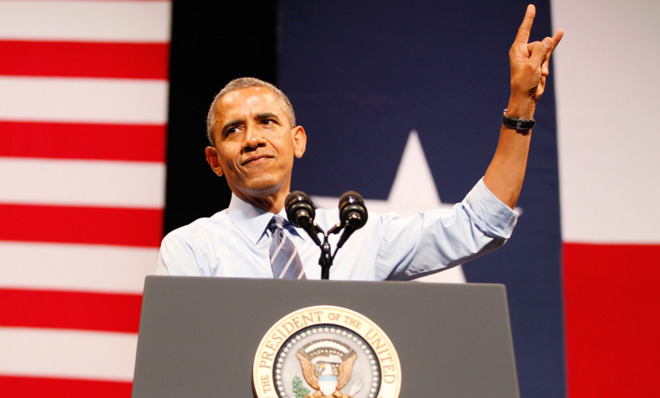Why the Republican freak-out over Obama's immigration order is both dumb and inhumane
Critics have labeled his impending executive action "domestic Caesarism." But the conservative backlash is out of touch with reality.


A free daily email with the biggest news stories of the day – and the best features from TheWeek.com
You are now subscribed
Your newsletter sign-up was successful
Like it or not, these are the facts: There are 11.7 million undocumented immigrants living in United States. The U.S. Immigrant and Customs Enforcement only has the capacity to remove about 400,000 per year. That's less than 4 percent of the total undocumented population.
Keep these facts in mind as President Obama prepares to announce an executive action to protect certain classes of undocumented immigrants — and as Republicans lose their minds over it. Obama's expected move isn't a sinister example of "domestic Caesarism," as Ross Douthat would have it, or "stealth amnesty," in the words of Reihan Salam. It is an eminently reasonable response in the face of congressional inaction, while the conservative opposition puts them on the wrong side of both basic humanitarian instincts and public welfare.
The executive action is expected to expand deferred action to more undocumented immigrants. Deferred action provides an assurance to certain immigrants that they won't be pursued for deportation. With it comes work permits, so those who won't be deported can pursue legitimate work.
The Week
Escape your echo chamber. Get the facts behind the news, plus analysis from multiple perspectives.

Sign up for The Week's Free Newsletters
From our morning news briefing to a weekly Good News Newsletter, get the best of The Week delivered directly to your inbox.
From our morning news briefing to a weekly Good News Newsletter, get the best of The Week delivered directly to your inbox.
The legal basis for deferred action is grounded in prosecutorial discretion — the authority of law enforcement agencies to determine how and when to enforce the law. Such discretion is necessary given scarce agency resources. It's why police and prosecutors devote most of their time to pursuing serious offenses rather than going after every crime on the books. It would be a waste of resources to charge and punish jaywalkers or adulterers, for instance.
Given these constraints, officials have prioritized certain classes of immigrants for removal. ICE specifically targets three categories of undocumented immigrants: those who present national security or public safety risks; those who have recently entered; and those who have reentered after being removed.
These targets guide immigration enforcement actions. In 2013, there were 368,644 removals. Ninety-eight percent met one of ICE's three priorities. Of these, 235,093 were removed while trying to enter at the border. Among the 133,551 removed while living inside the United States, 82 percent had a previous criminal conviction.
Just as there are removal targets at the top of ICE's list, there are non-targets at the bottom. These are classes of undocumented immigrants that agents opt to ignore. These categories, outlined in the 2011 Morton Memo, include U.S. military veterans, minors, elderly persons, and pregnant women, among others.
A free daily email with the biggest news stories of the day – and the best features from TheWeek.com
This list broadly tracks the immigrants that we may see benefit from expanded deferred action under Obama's executive order. As Eric Posner argues, Obama's order would in many respects do little more than bless preexisting policy. But it would also give some legal guarantee to peaceable immigrants at the distant, unreachable bottom of ICE's priority list, allowing them access to aboveboard work in the process.
Conservatives will undoubtedly seethe over Obama's unilateral action. But once they exhaust their procedural objections, any substantive opposition to the policy itself is either cruel or dangerous.
On the one hand, conservatives could object to a codification of ICE's existing practices. Under this argument, it's not selective enforcement of the law that's the problem, but explicitly telling immigrants who arrived in the country illegally that they're in the clear. Keeping the law hazy would subject law-abiding immigrants to an illusory fear, supposedly discouraging migrant flows.
This is a deeply inhumane tactic. Their preference would be for millions of immigrants to needlessly live with the specter of deportation hanging over their heads. This would condemn them to living in the shadows and working in tenuous, often-exploitative conditions — even though immigration officials have no interest in deporting them.
The other objection — rejecting prosecutorial discretion outright — isn't any more heartening. This would involve ICE pursuing every undocumented immigrant with equal zeal.
This would be a policy that jeopardizes national security and public safety. Short of expanding enforcement capacity by a factor of 30, time spent expelling military veterans or parents would allow more gang members and felons to slip through the cracks of strained budgets. As John Sandweg, former Homeland Security general counsel, said, "If we eliminated all priorities, and treat [all undocumented immigrants] equally, you are going to make the country less safe, and make the border less secure."
When he announces his executive action, Obama should remind the country that prosecutorial discretion in immigration keeps us safe. Deferred action is a fairly minor step to provide some peace of mind to those that our immigration system already doesn't care about deporting, making it easier for them to live freely and work productively. If conservatives still object, it will be clear that they remain far from being fit to step in and lead as moral and protective stewards for our country.
Joel Dodge writes about politics, law, and domestic policy for The Week and at his blog. He is a member of the Boston University School of Law's class of 2014.
-
 Switzerland could vote to cap its population
Switzerland could vote to cap its populationUnder the Radar Swiss People’s Party proposes referendum on radical anti-immigration measure to limit residents to 10 million
-
 Political cartoons for February 15
Political cartoons for February 15Cartoons Sunday's political cartoons include political ventriloquism, Europe in the middle, and more
-
 The broken water companies failing England and Wales
The broken water companies failing England and WalesExplainer With rising bills, deteriorating river health and a lack of investment, regulators face an uphill battle to stabilise the industry
-
 The billionaires’ wealth tax: a catastrophe for California?
The billionaires’ wealth tax: a catastrophe for California?Talking Point Peter Thiel and Larry Page preparing to change state residency
-
 Bari Weiss’ ‘60 Minutes’ scandal is about more than one report
Bari Weiss’ ‘60 Minutes’ scandal is about more than one reportIN THE SPOTLIGHT By blocking an approved segment on a controversial prison holding US deportees in El Salvador, the editor-in-chief of CBS News has become the main story
-
 Has Zohran Mamdani shown the Democrats how to win again?
Has Zohran Mamdani shown the Democrats how to win again?Today’s Big Question New York City mayoral election touted as victory for left-wing populists but moderate centrist wins elsewhere present more complex path for Democratic Party
-
 Millions turn out for anti-Trump ‘No Kings’ rallies
Millions turn out for anti-Trump ‘No Kings’ ralliesSpeed Read An estimated 7 million people participated, 2 million more than at the first ‘No Kings’ protest in June
-
 Ghislaine Maxwell: angling for a Trump pardon
Ghislaine Maxwell: angling for a Trump pardonTalking Point Convicted sex trafficker's testimony could shed new light on president's links to Jeffrey Epstein
-
 The last words and final moments of 40 presidents
The last words and final moments of 40 presidentsThe Explainer Some are eloquent quotes worthy of the holders of the highest office in the nation, and others... aren't
-
 The JFK files: the truth at last?
The JFK files: the truth at last?In The Spotlight More than 64,000 previously classified documents relating the 1963 assassination of John F. Kennedy have been released by the Trump administration
-
 'Seriously, not literally': how should the world take Donald Trump?
'Seriously, not literally': how should the world take Donald Trump?Today's big question White House rhetoric and reality look likely to become increasingly blurred
